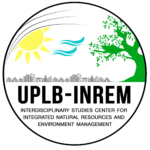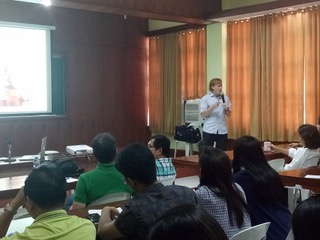The Interdisciplinary Studies Center for Integrated Natural Resources and Environment Management (IDSC-INREM) hosts Dr. Ross Michael Pink during the INREM Seminar Series held on 15th August 2015. His lecture entitled “Water Rights and Climate Change in the Asian Context” was held at the AV Manza Hall of the College of Forestry and Natural Resources, UP Los Banos.
Dr. Pink started his presentation by saying that only 2% of the world’s water is fresh and half of that amount is unusable due to contamination and pollution. Having access to safe drinking water is a right, and water should not be commoditized. But one can no longer access clean potable water without paying an amount. This dilemma deprives more the poor people to have access to clean water.
How can water and food security be in place when the UN project that world population will reach 9.6 billion by 2050? This is translated to increasing food production to satisfy the increasing demand by population and changing diet patterns. Increasing food production means increased water for the crops to grow and produce. Solutions forwarded in having sufficient water include rain water harvesting, desalinization, cloud seeding. Change in food production patterns should also be thought about, especially the younger generation that favors more meat diet rather than vegetables.
Water crisis is exacerbated more by the changing climate. In the Philippines, climate change impacts include: sea level rise by 40-60 cm by 2100, 2 M people affected by flooding annually, salt water intrusion, increased storm activity. About 60% of the Philippine population live in coastal areas are likely to be affected by salt water intrusion and sea level rise. Also, the Philippines is second highest nation for population exposed to floods and storms, 4th highest for GDP losses at 24.3 billion as reported by IPCC, and is at the top 5 countries for risk to population from sea level rise by 2050.
Agriculture economies like the Philippines will be greatly affected by climate changes like typhoons, extreme rainfall, prolonged dry seasons and can harm agricultural productivity which employs about 35% of the Philippine population.
Innovation for food production include producing our own food through small backyard gardens, community gardens, roof top gardens, transition towns, and garden condo towers. We should also think about changing to vegetarian diet where water usage is not as consumptive as animal production.
A total of eighty (80) graduate students, faculty and staff and undergraduate students from different units within UP Los Banos came to listen and interact with Dr. Pink.
Dr. Pink is a Professor of Political Science and Sustainability at Kwantlen Polytechnic University from Canada and a Co-founder of the Global Water Rights, Inc. He is an author of two environmental books entitled ‘Water Rights in Southeast Asia and India’ published in 2015 and ‘The Climate Change Crisis: Solutions and Adaption for a Planet in Peril’ published in 2018, both by Palgrave Macmillan. CC de Luna/INREM

